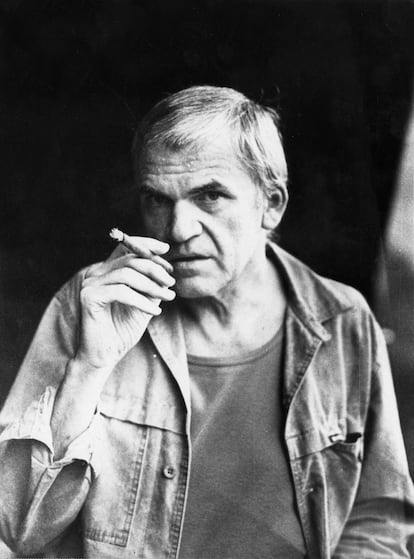Milan Kundera: Irony and the novel
In ‘The Joke’, the Czech-French writer began to explore the subject that would haunt him all his life: human beings’ fight against the forces that rob them of their freedom

In December 1968, a young Czech writer met three Latin American authors in a sauna on the banks of the Vltava River. The Latin Americans were Gabriel García Márquez, Julio Cortázar and Carlos Fuentes, who had come to Prague on the invitation of the Union of Czech Writers, to see with their own eyes what was happening after the Soviet repression of the previous spring. Their Czech counterpart was Milan Kundera, who had met Fuentes a few months earlier in Paris, and had told him that the best support the Czechs could receive was to be visited as if the Russians weren’t there. But he asked them to meet at a sauna, Fuentes would later explain, because “it was one of the few places without ears on the walls”: that is, because the Russians were everywhere, and so were their spies. A few months later, García Márquez learned that his novel One Hundred Years of Solitude was competing with another one by Kundera for the prize of best foreign book in France, and he wished they would give it to that Czech writer, an “unleashed madman who explained to us the problems of his country first at 120 degrees above zero and then at 20 degrees below zero.” Because the walls had ears.
The scene seems straight out of The Joke, the beautiful novel where Kundera began to explore the subject that would haunt him for the rest of his life: the struggle of human beings against the forces, whatever these may be, that are out to steal their freedom. The Joke tells the story of Ludvik, a young communist militant who allows himself a joke in a letter and later sees how that brief, spontaneous line sends his whole life to hell. Kundera was always concerned about that trait of totalitarian mentality: the invasion and destruction of people’s private lives — yes: the walls that listen —, and he reflected that concern in his marvelous readings of Kafka, but above all he was concerned about our relationship with humor and irony. Spaces where there is no room for humor, where irony is frowned upon, seemed to him not only undesirable, but downright dangerous, and one of the worst adjectives in his personal dictionary was a word made up by Rabelais: agélaste, which means “he who does not know how to laugh.” The humorless readings of his novels terrified him above all things, and he always believed in Octavio Paz’s idea that humor, or at least the humor that took shape with Miguel de Cervantes, is the great invention of modern times.
Kundera wrote a handful of novels that I continue to read, taking pleasure in his precise intelligence and delicate humor (which is, of course, a function of intelligence), but none of his works of fiction take the same pride of place on my bookshelves as his trilogy of essays: The Art of the Novel, Testaments Betrayed and The Curtain. They are the musings of a novelist on the place of the novel in our world, and I can think of no more than three names in the entire history of this misunderstood art that have left behind better reflections, or better scholarship, than Milan Kundera. Now he is dead, after years of living in a certain sense outside the world, hidden from it, and we who have learned to read in another way thanks to his books, will perhaps remember how much he liked a phrase by Gustave Flaubert: “The artist must manage to make posterity believe that he has not lived at all.” I don’t know if he seriously tried to live by that motto, but here we are, his readers, mourning his death.
Tu suscripción se está usando en otro dispositivo
¿Quieres añadir otro usuario a tu suscripción?
Si continúas leyendo en este dispositivo, no se podrá leer en el otro.
FlechaTu suscripción se está usando en otro dispositivo y solo puedes acceder a EL PAÍS desde un dispositivo a la vez.
Si quieres compartir tu cuenta, cambia tu suscripción a la modalidad Premium, así podrás añadir otro usuario. Cada uno accederá con su propia cuenta de email, lo que os permitirá personalizar vuestra experiencia en EL PAÍS.
¿Tienes una suscripción de empresa? Accede aquí para contratar más cuentas.
En el caso de no saber quién está usando tu cuenta, te recomendamos cambiar tu contraseña aquí.
Si decides continuar compartiendo tu cuenta, este mensaje se mostrará en tu dispositivo y en el de la otra persona que está usando tu cuenta de forma indefinida, afectando a tu experiencia de lectura. Puedes consultar aquí los términos y condiciones de la suscripción digital.









































